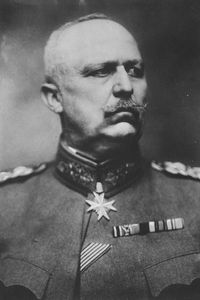Erich Friedrich Wilhelm Ludendorff, a prominent German general, politician, and military strategist, achieved widespread recognition during World War I due to his crucial role in the German victories at Liège and Tannenberg in 1914.
As he rose to the esteemed position of First Quartermaster-general, also known as Erster Generalquartiermeister, of the Imperial Army's prestigious Great General Staff in 1916, he emerged as the chief architect of policy in a de facto military dictatorship that exercised significant control over Germany for the remainder of the war.
Following Germany's defeat, Ludendorff made a significant contribution to the ascent of the Nazi Party to power.
















